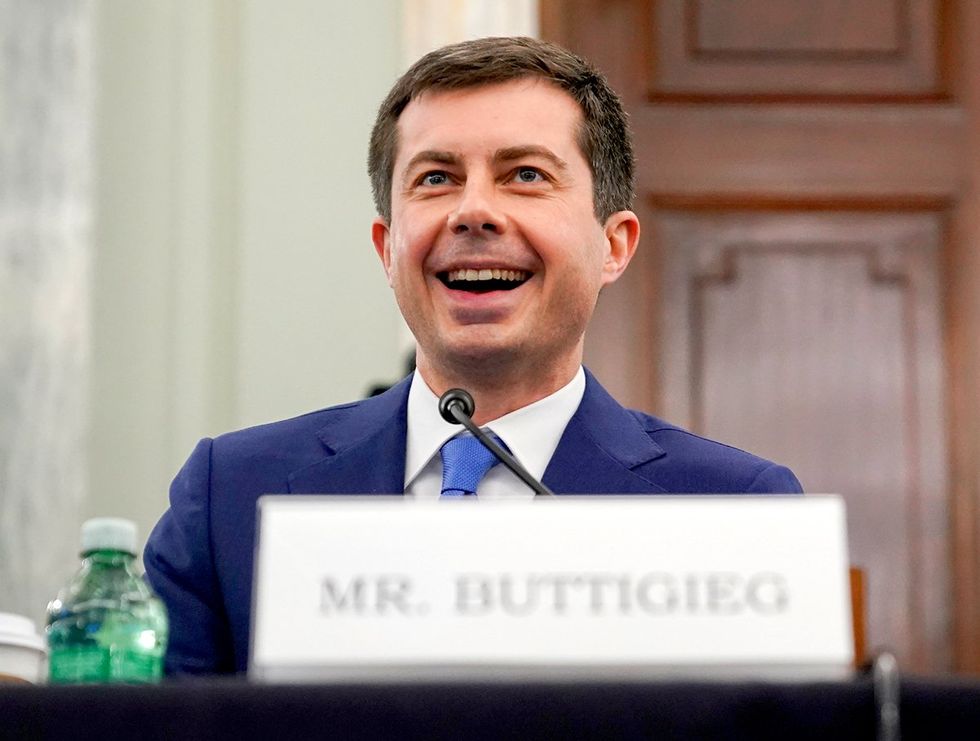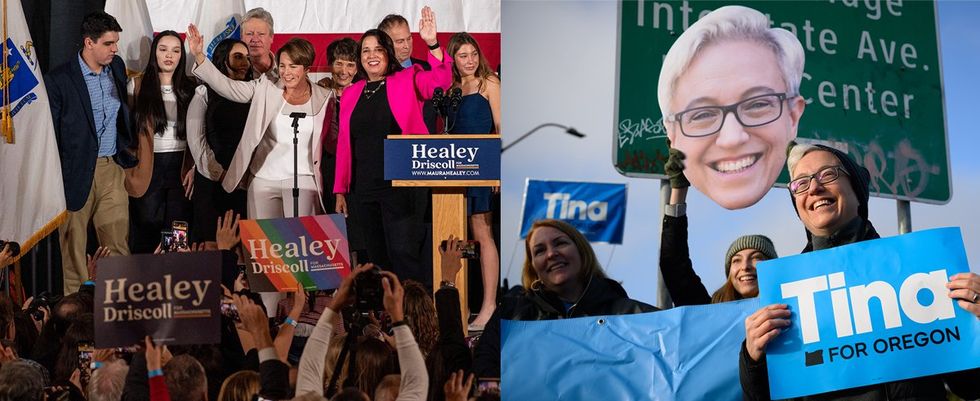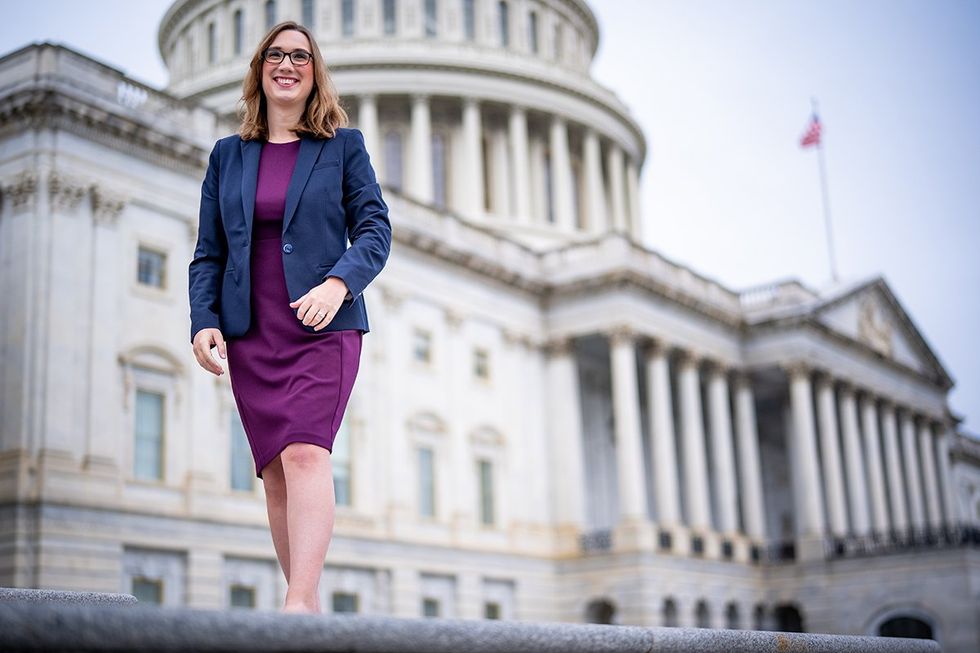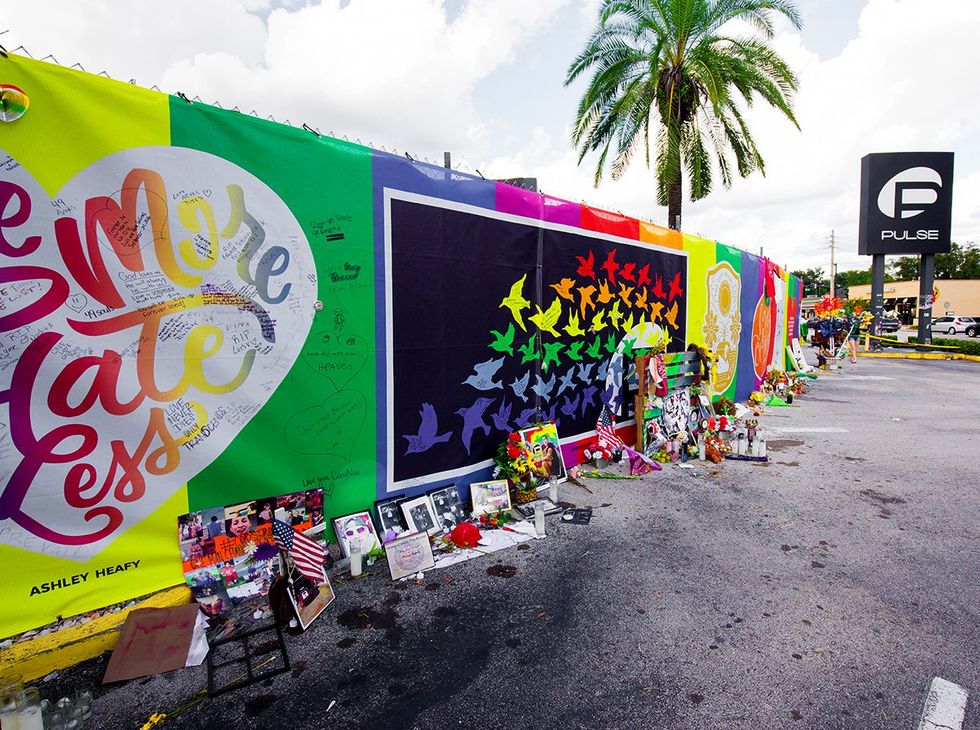Justin Sullivan/Getty Images; Hyoung Chang/The Denver Post; Michael Nigro/Pacific Press/LightRocket via Getty Images; Andrew Harnik/Getty Images; Darren McCollester/Getty Images
The 21st century is the time most accepting of LGBTQ+ lives yet. LGBTQ+ people are living more and more openly, closing closet doors and entering life in their authentic way. The recent swath of anti-transgender legislation has tried to slow down the queer rights movement that has won hard-fought victories over the past few decades, but trans rights activists aren’t backing down and trans history continues to be made. From the good and the bad, from marriage equality, decriminalization of queer sex, and groundbreaking electoral victories to the Pulse massacre and the unfortunate election of Donald Trump to the presidency — twice — here are the biggest queer news events of the first quarter of the 21st century.
Keep up with the latest in LGBTQ+ news and politics. Sign up for The Advocate’s email newsletter.
25. Biden lifts Trump trans military ban

Doug Mills/Pool/Getty Images; Michael Nigro/Pacific Press/LightRocket via Getty Images
Donald Trump shocked the nation with a tweet in July 2017 announcing he would bar transgender people from serving in the military. The ban on open service by trans Americans had just been lifted the previous year by President Barack Obama and his secretary of Defense, Ash Carter. Trump claimed that allowing trans people to serve openly interfered with military readiness and that their health care was too costly for the government to support. Numerous studies have contradicted such claims.
It took until 2019 for the ban to go into effect, and there wasn’t the expected discharge of the thousands of trans people already in uniform, as most of them were considered grandfathered in, but trans folks couldn’t enlist. President Joe Biden came into office in 2021 having pledged to lift the Trump ban as one of his first actions, and he kept his word, issuing an executive order to that effect on January 25, 2021, five days into his term.
“President Biden believes that gender identity should not be a bar to military service, and that America’s strength is found in its diversity,” said a White House fact sheet released with his order.
24. FDA ends ban on LGBTQ+ blood donors

shutterstock creative
In May 2023, the Food and Drug Administration implemented a major policy change ending its long-standing ban that barred gay and bisexual men from donating blood. The FDA shifted to a risk-based, individual-donor assessment rather than categorical exclusions. Under the new guidelines, all donors, regardless of sexual orientation, undergo screenings based on recent sexual behavior and other factors. This adjustment followed years of advocacy by LGBTQ+ organizations and health experts who pointed to advancements in blood testing technology and questioned the fairness of blanket prohibitions. The updated policy aligned the United States with several countries that had already adopted similar evidence-based guidelines. Blood banks began updating their procedures, training staff, and revising donor questionnaires. While some called for further refinements, the policy’s enactment expanded the potential donor pool and addressed shortages in the nation’s blood supply.
23. Rachel Levine becomes first trans person confirmed by U.S. Senate

Official portrait: Assistant Secretary for Health Admiral Rachel L. Levine, US Public Health Service Commissioned Corps
Chris Sean Smith, U.S. Public Health Service Commissioned Corps
In March 2021, Dr. Rachel Levine became the first openly transgender individual confirmed by the U.S. Senate for a federal government role. Approved as Assistant Secretary for Health under President Joe Biden’s administration, Levine brought extensive medical and administrative experience to her position. Previously serving as Pennsylvania’s Secretary of Health, she guided the state through responses to the opioid crisis and the COVID-19 pandemic. Her federal responsibilities included overseeing public health initiatives, addressing mental health challenges, and supporting medical research efforts. Her appointment occurred amid ongoing discussions about transgender rights, health care accessibility, and discrimination protections for LGBTQ+ Americans. Levine’s role placed her at the forefront of federal health policy implementation, public awareness campaigns, and interagency coordination on health matters.
22. Laverne Cox and the Transgender Tipping Point

Laverne Cox speaks during the 25th Annual GLAAD Media Awards on April 12, 2014 in Beverly Hills, California
Gabriel Olsen/Getty Images
Laverne Cox’s appearance on Time magazine’s cover in May 2014 was dubbed “The Transgender Tipping Point” for a reason – it was the first time an out trans person appeared on the publication’s cover, as well as the moment many people were first introduced to the trans community. The Orange Is the New Black actor, who made waves with her monumental role on the show, said the honor was both a “dream come true” and a “huge responsibility,” as she was representing “a population of people who had systematically been stigmatized, objectified, sensationalized, exploited, pathologized, criminalized and far too often disappeared from history in various ways.” After nationwide attacks on trans athletes and gender-affirming care, trans people have fewer rights today than they did at the time of Cox’s historic story.
21. Kamala Harris becomes first sitting vice president to attend a Pride Parade

Vice President Harris and her husband at Pride in D.C.
Anna Moneymaker/Getty Images
In June 2021, Vice President Kamala Harris made history by attending a Pride parade in Washington, D.C., becoming the first sitting U.S. vice president to participate in such an event. Accompanied by Second Gentleman Doug Emhoff, Harris joined marchers, waving to onlookers and greeting participants. She wore a T-shirt bearing the message “Love Is Love.” Her attendance occurred amid increased public debates on LGBTQ+ equality and proposed legislation affecting queer and transgender Americans. While at the parade, Harris spoke briefly to people gathered along the route, acknowledging the importance of celebrating Pride and affirming that the Biden-Harris administration supported efforts to secure equality and fairness. The vice president’s visible presence and engagement at the parade came as LGBTQ+ advocates pushed for the passage of the Equality Act and other protective measures. During her tenure, Harris often hosted Pride Month celebrations and opened her official residence to the LGBTQ+ community.
20. Bostock V. Clayton County LGBTQ+ workplace discrimination ruling

Lee Charlie/Shutterstock
On June 15, 2020, the U.S. Supreme Court ruled 6-3 in Bostock v. Clayton County that the Civil Rights Act of 1964’s Title VII, in banning sex discrimination, prohibits discrimination against employees based on sexual orientation or gender identity. The consolidated case involved three plaintiffs who alleged they were terminated from their jobs for being gay or transgender. Justice Neil Gorsuch, an appointee of Donald Trump, authored the majority opinion, writing, “An employer who fires an individual merely for being gay or transgender defies the law.” This decision extended federal protections to millions of LGBTQ+ workers across the United States, clarifying a previously contested point of antidiscrimination law. The ruling built on years of advocacy and legal battles LGBTQ+ rights organizations emphasized its significance, as employers nationwide were required to ensure compliance with the clarified interpretation, prompting many to revisit their policies and training. Bostock v. Clayton County became a foundational reference point for subsequent discussions about the scope of LGBTQ+ rights under federal statutes.
19. Jared Polis is first out gay governor elected

Democratic candidate Jared Polis accepts the nomination for Colorado Governor during his watch party at the Flatiron Ballroom in the Renaissance Boulder Flatiron Hotel on June 26, 2018 in Broomfield, Colorado.
Helen H. Richardson/The Denver Post via Getty Images
In 2018, Colorado Democrat Jared Polis became the first out gay man to be elected as governor of any state, and he still holds the position today, having been reelected in 2022. He married partner Marlon Reis in 2021, marking the first same-sex wedding of a sitting governor. During his tenure, Polis has managed to solidify several LGBTQ+ rights into law, including banning conversion therapy for youth, banning the LGBTQ+ “panic” defense, and making the state a sanctuary for abortion and gender-affirming care.
18. Pete Buttigieg becomes first senate-confirmed gay cabinet member

Pete Buttigieg, U.S. secretary of transportation nominee for U.S. President Joe Biden, smiles during a Senate Commerce, Science and Transportation Committee confirmation hearing on January 21, 2021 in Washington, D.C.
Stefani Reynolds/Pool/Getty Images
In February 2021, the U.S. Senate confirmed Pete Buttigieg as secretary of Transportation, making him the first out gay person to hold a Senate-confirmed Cabinet position. Buttigieg, the former mayor of South Bend, Ind., was nominated by President Joe Biden. His confirmation followed a Senate vote that reflected bipartisan support for his credentials, including military service as a Navy Reserve officer and experience overseeing South Bend’s redevelopment projects. As secretary of Transportation, Buttigieg began implementing the Infrastructure Investment and Jobs Act, addressing issues such as public transit expansion, highway improvements, aviation safety, and sustainable transportation. His appointment was a significant development in LGBTQ+ representation within the federal government. Buttigieg’s presence in the Cabinet affirmed growing acceptance of LGBTQ+ people in leadership at the federal level.
Before joining the Biden administration, Buttigieg ran for the Democratic nomination for president, becoming the second out gay major-party candidate to seek the nation’s highest office. He performed strongly in the Iowa caucus and New Hampshire primary.
17. Transgender politicians see electoral wins

Danica Roem, center, who ran for house of delegates against GOP incumbent Robert Marshall, is greeted by supporters as she prepares to give her victory speech with Prince William County Democratic Committee at Water’s End Brewery on Tuesday, November 7, 2017, in Manassas, VA.
Jahi Chikwendiu/The Washington Post via Getty Images
Sarah McBride isn’t the only transgender politician who made history this century. We also have Danica Roem, who was the first out trans person elected to and seated in a state legislature (a trans woman had been elected to New Hampshire’s legislature in 2012 but withdrew before being sworn in). Roem, a Democrat, was elected to the Virginia House of Delegates in 2017 from a northern Virginia district, beating incumbent Bob Marshall, the most anti-LGBTQ+ member of the legislature. She served three terms there, then was elected to the Virginia Senate in 2023, making her the nation’s second out trans state senator (McBride was the first). More than 50 out trans people have been elected to office around the nation in the 21st century. These groundbreakers include state legislators Zooey Zephyr and SJ Howell in Montana, Gerri Cannon and James Roesener in New Hampshire, Brianna Titone in Colorado, Leigh Finke in Minnesota, and Taylor Small in Vermont; city officials Andrea Jenkins in Minneapolis, Olivia Hill in Nashville, and Tyler James Titus in Erie, Pa.; and many others. Trans state legislators just elected this year, who’ll be the first in their states, include Hawaii’s Kim Coco Iwamoto, Iowa’s Aime Wichtendahl, and Missouri’s Wick Thomas.
16. Ellen’s comeback and talkshow

Warner Bros. Entertainment
Hollywood largely booted lesbian comic Ellen DeGeneres after her coming out. Her acclaimed sitcom was canceled the season after her coming out on the show (and in real life publicly) and her rise in the business seemed to have reversed course. However, in 2003, her talk show debuted. The rest is history. The Ellen DeGeneres Show ran for 19 seasons and won countless awards. DeGeneres again became a household name. The show never shied away from her identity and she often featured her wife, Portia DeRossi. The talk show blended comedy, celebrity interviews, musical guests, and human-interest stories. The show eventually came to an end in 2022, shortly after controversy emerged of an alleged toxic work culture cultivated by DeGeneres. Still, the impact of the show’s success for queer representation was huge as well as reviving the career of a lesbian comedian who had already made a huge impact for being out in the world of television.
15. President Joe Biden signs Respect for Marriage Act into law

President Joe Biden hosts a ceremony on the South Lawn to sign the Respect for Marriage Act on December 13 in Washington, DC.
Bill O’Leary/The Washington Post via Getty Images
On December 13, 2022, President Joe Biden signed the Respect for Marriage Act into law, ensuring federal protections for same-sex and interracial marriages. The legislation requires all states to recognize marriages legally performed elsewhere. Biden’s signing followed concerns that established rights could face future challenges. Moments after enacting the law, Biden presented the signing pen to Vice President Kamala Harris, who is in an interracial marriage to Second Gentleman Doug Emhoff and had fought for marriage equality as California attorney general.
“I didn’t expect it. [I] had no idea he was going to do that. I was so touched!” Harris recalled in a 2023 interview with The Advocate.
The act arrived amid debates about the security of LGBTQ+ rights and marriage equality following shifts in the Supreme Court’s composition and its overturning of Roe v. Wade, with Justice Clarence Thomas saying marriage equality should be overturned next. Civil rights advocates urged elected officials to preserve legal recognition for same-sex and interracial couples.
14. Maura Healey and Tina Kotek voted in as first lesbian governors

Democratic Massachusetts Governor Elect Maura Healey (L) and Lieutenant Governor nominee Kim Driscoll (R) celebrate victory during a watch party at the Copley Plaza hotel on election night in Boston, Massachusetts on November 8, 2022. Oregon Democratic Gov. Tina Kotek rallies with her supporters near the Broadway Bridge on November 8, 2022 in Portland, Oregon.
JOSEPH PREZIOSO/AFP via Getty Images; Mathieu Lewis-Rolland/Getty Images
November 2022 saw the election of the nation’s first two out lesbian governors, both Democrats.
Maura Healey, who’d been Massachusetts attorney general, was elected to the state’s top office, and Tina Kotek, a veteran Oregon state legislator, won the race for governor there, succeeding another history-maker, bisexual woman Kate Brown. Both took office in January 2023, Kotek a few days later than Healey.
“Our greatest strength is our people, but we cannot reach our potential as a state when so many are held back from reaching their own,” Healey said in her inaugural address. “People of color, people with disabilities, women, LGBT residents —- they continue to face barriers that have held them back for generations. We must center equity in all we do.”
Kotek, in her inauguration speech, promised to address the most pressing issues facing Oregon, including homelessness, a lack of affordable housing, and the need for access to behavioral health care. “We won’t be perfect, but we will improve every year, so Oregonians can proudly say their state government was there for them,” she said. She gave her a shout-out to her wife, Aimee Wilson, after taking the oath of office, calling Wilson “the first lady of Oregon” and adding, “Thank you, my love, for your support.”
13. HIV prevention medication

Gilead truvada pills in a hand
Marc Bruxelle
The introduction of pre-exposure prophylaxis (PrEP) changed the fight against HIV. PrEP is highly effective in preventing HIV and cuts the risk of contracting it. The use of PrEP has shown to cut the risk of HIV transmission through sexual intercourse by up to 99 percent. It was approved for use by the FDA in 2012, completely changing how queer men could relate to and navigate their sexuality. While at-risk groups are still slow to take up PrEP usage fully, it’s been revolutionary in combating the spread of HIV.
12. Club Q shooting

Photos of the shooting victims are displayed at a makeshift memorial outside of Club Q on November 22, 2022 in Colorado Springs, Colorado.
Chet Strange/Getty Images
In the last minutes of November 19, 2022, a gunman began shooting at a gay bar in Colorado Springs, Colo. The shooter, Anderson Lee Aldrich, killed five people and injured around 20 others. The rampage was only stopped by the brave patrons ofClub Q despite the shooter being armed with a privately manufactured assault weapon. The five who died were Daniel Aston, Raymond Green Vance, Kelly Loving, Ashley Paugh, and Derrick Rump. Aldrich pled guilty to tens of state and federal charges. He’ll spend the rest of his life incarcerated. As part of the plea agreement, Aldrich admitted that their actions were driven by hatred towards the sexual orientation and gender identity of the victims. The shooting pushed Colorado Gov. Jared Polis to push for better gun protections.
11. Sarah McBride makes history as first trans member of Congress

Rep.-elect Sarah McBride (D-DE) poses for a photograph after joining other congressional freshmen of the 119th Congress for a group photograph on the steps of the House of Representatives at the U.S. Capitol Building on November 15, 2024 in Washington, DC.
Andrew Harnik/Getty Images
In November 2024, Sarah McBride won Delaware’s at-large seat in the U.S. House of Representatives, making her the first out transgender person elected to Congress. She previously served as a Delaware state senator — the first out trans state senator in the nation — and gained recognition for championing paid family and medical leave as well as legislation banning the “gay and trans panic” defense. Following her historic victory, McBride stated, “Thank you, Delaware! Because of your votes and your values, I am proud to be your next member of Congress.” McBride’s election occurred as the nation continued debating LGBTQ+ rights and the representation of transgender Americans at the federal level. Her win came after a campaign focusing on health care, economic security, and civil rights, and her presence in Congress marks a new chapter for transgender visibility in U.S. politics.
10. Obama signs hate crimes prevention act

US President Barack Obama applauds the sisters of James Byrd, Jr., Betty Byrd Boatner (2nd R) and Louvon Harris (2nd L), and the parents of Matthew Shepard, Judy Shepard (C) and Dennis Shepard (L) after Obama spoke in honor of the enactment of the Matthew Shepard and James Byrd, Jr., Hate Crimes Prevention Act during a reception in the East Room of the White House in Washington, DC, October 28, 2009.
SAUL LOEB/AFP via Getty Images
The Matthew Shepard and James Byrd, Jr. Hate Crimes Prevention Act, passed by Congress and signed into law by President Barack Obama in October 2009, was the first pro-LGBTQ+ federal law. It’s named for Shepard, a gay college student murdered at age 21 in Wyoming in 1998, and Byrd, a Black man dragged to death behind a truck in Texas the same year.
Calls for an LGBTQ-inclusive federal hate-crimes law had been coming even before those tragedies, but Congress didn’t act. The original federal hate-crimes law, passed in 1968, covered crimes motivated by the victim’s race, religion, or national origin only.
President Bill Clinton supported expanding the law, but it didn’t happen during his tenure, and his successor, George W. Bush, was opposed. Obama’s election in 2008 brought renewed hope for inclusive legislation, but it still took the actions of activists like Matthew’s parents, Judy and Dennis Shepard, and many others to convince lawmakers.
Judy Shepard has recalled hearing right-wingers claim such a law would enable prosecution of “thought crimes,” such as a minister’s sermon against homosexuality; it didn’t. In practical terms, the Shepard-Byrd Act empowers the U.S. Department of Justice to gather data on crimes motivated by sexual orientation or gender identity and to help local law enforcement investigate and prosecute such crimes or handle the investigation and prosecution if local officials cannot or will not. Whether a hate-crime conviction leads to enhanced punishment is generally up to each state.
9. The anti-transgender violence epidemic

Brianna Ghey death A member of the public attends a candle-lit vigil at Old Market Place in Warrington, in memory of transgender teenager Brianna Ghey.
Danny Lawson/PA Images via Getty Images
Transgender people have been at disproportionate risk of fatal violence for ages upon ages, both in the U.S. and around the world — Transgender Day of Remembrance, founded initially to honor slain Massachusetts trans woman Rita Hester, has been observed annually since 1999. But it took until around 2013 for LGBTQ+ activists and media to really get serious about tracking this violence. Since January of that year, the Human Rights Campaign and other advocates have identified 372 transgender and gender-expansive people who were victims of fatal violence in the U.S. Black trans women, who are at heightened risk because of the combination of their gender, trans identity, and race, make up 61 percent of those victims. In 2021, The Advocate documented 57 violent deaths of trans, nonbinary, and gender-nonconforming people, a record high. But in any given year, the actual number is likely higher than that reported by activists and LGBTQ+ media, as victims are often deadnamed or misgendered by police and local media, or their deaths not reported at all.
8. Tammy Baldwin elected to the Senate, becoming first LGBTQ+ senator

Tammy Baldwin, D-Wis., during the House Budget markup of the budget resolution in 2004.
Scott J. Ferrell/Congressional Quarterly/Getty Images
Tammy Baldwin has made LGBTQ+ history over and over. After being a state and county legislator in Wisconsin, Baldwin, a lesbian, was elected to the U.S. House in 1998, making her the first LGBTQ+ House member elected while being out in her first race; others had come out while already in office. In 2012, she was elected to the U.S. Senate, becoming its first out LGBTQ+ member, and she was reelected in 2018 and 2024. Baldwin has used her position to advocate for LGBTQ+ equality, reproductive freedom, health care, workers’ rights, and more. Most recently, she led the opposition to a provision in the National Defense Authorization Act denying insurance coverage under the military’s TriCare plan for gender-affirming treatment for trans people under 18, something that will affect children of service members. With Kyrsten Sinema and Laphonza Butler leaving the Senate, Baldwin will now be the only out LGBTQ+ person there.
7. The repeal of “don’t ask, don’t tell”

Military personnel march down University Avenue during the San Diego gay pride parade July 16, 2011 in San Diego, California.
Sandy Huffaker/Getty Images
President Bill Clinton, who took office in 1993, had promised to lift the ban on lesbian, gay, and bisexual people in the military but ran into opposition in Congress, so “don’t ask, don’t tell” was crafted as a compromise. DADT, in effect from February 28, 1994, until September 20, 2011, meant that LGB troops couldn’t be open about their sexual orientation and that their superior officers were not supposed to ask about it. But LGB service members continued to be investigated and discharged under DADT — about 13,500 of them.
Another Democratic president, Barack Obama, had campaigned on a promise to repeal DADT. Many LGBTQ+ activists thought he wasn’t moving fast enough on the matter after he became president in 2009, but they kept up the pressure, with protests, lobbying, and more. Both houses of Congress passed the repeal bill in December 2010, and Obama quickly signed it into law. Military leaders then were tasked with devising a plan for implementation of the repeal, and it finally went into effect September 20, 2011. Most service members who received less-than-honorable discharges under DADT have been able to get them upgraded, but some are still waiting.
6. Trump elected…twice

Donald Trump speaks at an event.
Jonah Elkowitz/Shutterstock
Donald Trump’s victory over Hillary Clinton in the 2016 presidential election shocked many in the nation. Most pollsters and pundits had predicted that Clinton would win and become the nation’s first woman president, and Trump had offended many with his racist and sexist comments, including a boast about grabbing women by their genitals, and his insults toward his rivals. But somehow he prevailed, winning the Electoral College although Clinton won the popular vote by about 3 million. His presidency was disastrous in many ways, with anti-LGBTQ+ policies — especially targeting transgender Americans — and the appointment of far-right Supreme Court justices. When the COVID-19 pandemic hit in 2020, he even suggested injecting bleach as a treatment.
Joe Biden unseated Trump in 2020 and reversed many of his anti-LGBTQ+ actions, and he had a chance to appoint one Supreme Court member, Ketanji Brown Jackson, the first Black woman on the court. But with Biden’s age slowing him down, something shown especially in his debate with Trump, once again the Republican nominee, in June 2024, the pressure was on for Biden to end his reelection bid, which he did a month later. Vice President Kamala Harris became the Democratic nominee and generated much enthusiasm, but this time all observers expected the race to be close — and Trump won once again. He’s gotten even more hostile toward his opponents and has publicly wished to be a dictator. So LGBTQ+ people, women, immigrants, and many others are justifiably worried about what a second Trump administration holds.
5. Lawrence v. Texas

Cherry Jones, Grand Marshall of the 2003 Gay Pride March
Djamilla Rosa Cochran/WireImage
As of June 26, 2003, queer love was no longer a criminal act in any state. In Lawrence v. Texas, the U.S. Supreme Court struck down Texas’s sodomy law and all remaining ones in other states. The ruling reversed a stand the court had taken in 1986 in Bowers v. Hardwick, involving Georgia’s sodomy law, in which it upheld the Georgia law and others, saying, “The Constitution does not confer a fundamental right upon homosexuals to engage in sodomy.” But 17 years later, the court had changed. “Bowers was not correct when it was decided, and it is not correct today,” Justice Anthony Kennedy wrote for the 6-3 court majority. “It ought not to remain binding precedent. Bowers v. Hardwick should be and now is overruled.”
The Lawrence case did not involve minors, public conduct, or government recognition of same-sex relationships, Kennedy noted. “The case does involve two adults who, with full and mutual consent from each other, engaged in sexual practices common to a homosexual lifestyle,” he wrote. “The petitioners are entitled to respect for their private lives. The State cannot demean their existence or control their destiny by making their private sexual conduct a crime. Their right to liberty under the Due Process Clause gives them the full right to engage in their conduct without intervention of the government.” He also pointed out that society had changed since Bowers and the number of states with sodomy laws had dwindled, and he cited Supreme Court decisions asserting the right to privacy in contraception and abortion.
4. Massachusetts legalizes marriage equality

Moira Barrett (L) and Johanna Schulman, of Cambridge, ride in a car on June 12, 2004 during the 34th annual Boston Gay Pride Parade in Boston, Massachusetts.
Darren McCollester/Getty Images
The Massachusetts Supreme Judicial Court issued its groundbreaking decision in Goodridge v. Department of Public Health November 18, 2003, making Massachusetts the first U.S. state where same-sex couples could legally marry.
“The Massachusetts Constitution affirms the dignity and equality of all Individuals,” Chief Justice Margaret H. Marshall wrote in her majority ruling. “It forbids the creation of second-class citizens.” Gay and Lesbian Advocates and Defenders (now known as GLBTQ Legal Advocates and Defenders or GLAD Law) had sued the state in 2001 on behalf of seven same-sex couples. The ruling took effect May 17, 2004, and same-sex couples began marrying in the state. Some politicians in Massachusetts had tried to block the ruling by amending the state constitution — an effort backed by then-Gov. Mitt Romney. In the end, thanks to the activism of thousands of state residents, the move to amend the constitution failed. There was some backlash, with other states amending their constitutions to ban same-sex marriage, but in the end marriage equality gathered enough momentum that it couldn’t be denied.
3. Pulse Nightclub massacre

Memorial at Pulse, a gay nightclub in Orlando, Florida, United States.
Mia2you/Shutterstock
At the time, the shooting was the deadliest one in U.S. history. On June 12, 2016, Omar Mateen shot and killed 49 patrons of Pulse in Orlando, Fla., and injured more than 50. After the shooting, city police shot and killed Mateen after a three-hour stand off. More than 300 were in the club that night celebrating “Latin Night.” The shooting was also the deadliest terror attack on U.S. soil since September 11.
In the intervening years, Orlando has come together in historic shows of unity and suffered incredible disappointment with the collapse of plans for a memorial museum. Survivors, meanwhile, have soldiered forward with memories of a night dancing that ended in tragedy and trauma.
2. DOMA and Prop 8 are struck down (tie)

Edith Windsor (C), 83, is mobbed by journalists and supporters as she leaves the Supreme Court March 27, 2013 in Washington, DC. Protestors against Proposition 8 rally outside of the California Supreme Court May 26, 2009 in San Francisco, California.
Chip Somodevilla/Getty Images; Justin Sullivan/Getty Images
Marriage equality won a double victory in U.S. Supreme Court rulings on June 26, 2013. The court struck down the main portion, section 3, of the 1996 Defense of Marriage Act, which denied federal government recognition to same-sex marriages. Edie Windsor had sued to challenge the law. She and Thea Spyer became partners in the 1960s and were finally able to marry in Canada in 2007. But the U.S. did not recognize their marriage, so when Spyer died two years later, Windsor owed $363,000 in estate taxes — which she would not have owed if she had been married to a man. Surviving spouses are exempt from the tax, but the law defined “spouse” only in opposite-sex terms.
“DOMA violates basic due process and equal protection principles applicable to the Federal Government,” Justice Anthony Kennedy wrote for the 5-4 majority. The decision planted the seeds of the ruling for national marriage equality that came in 2015.
That day, the court also let stand a lower court’s ruling striking down California’s Proposition 8, a state constitutional amendment passed by voters in 2008 to revoke marriage equality. The California Supreme Court had ruled for marriage equality in May 2008, but when voters passed Prop. 8 in November, amending the state constitution overrode the ruling. U.S. District Judge Vaughn Walker ruled in 2010 so that Prop. 8 violated the U.S. Constitution. California state officials declined to defend Prop. 8, a conservative group called ProtectMarriage.com took up the defense and appealed Walker’s decision first to a federal appeals court, which upheld it, and then the Supreme Court, which ruled 5-4 that the group did not have what’s known as “standing” to appeal — that is, it hadn’t shown that its members were harmed by Walker’s decision. So Prop. 8 was no more, and the nation’s most populous state had marriage equality once again.
1. Marriage equality (tie)

Plaintiff James Obergefell in the Obergefell v. Hodges case speaks outside the US Supreme Court on April 28, 2015 in Washington, DC.
Olivier Douliery/Getty Images
It was something our community had been working toward for decades. On the two-year anniversary of the Supreme Court’s historic decisions leaving the Defense of Marriage Act and Proposition 8 behind, the high court consigned all other bans on same-sex marriage to the dustbin of history.
“The limitation of marriage to opposite-sex couples may long have seemed natural and just, but its inconsistency with the central meaning of the fundamental right to marry is now manifest,” Justice Anthony Kennedy wrote for the 5-4 court majority in Obergefell v. Hodges. The case was named for James Obergefell, an Ohio man who sought recognition of his marriage to his late husband, John Arthur, but it involved several couples from four states, Michigan, Ohio, Kentucky, and Tennessee, all appealing a ruling from the U.S. Court of Appeals for the Sixth Circuit, which had upheld those states’ marriage bans. Mary Bonauto, Douglas Hallward-Driemeier, and Donald Verrilli Jr. had successfully argued on the couples’ behalf. LGBTQ+ people and their allies rejoiced, and queer couples quickly applied for marriage licenses. The White House, then occupied by supportive President Barack Obama and his family, was bathed in rainbow lights in celebration.
Source: Advocate.com – www.advocate.com




